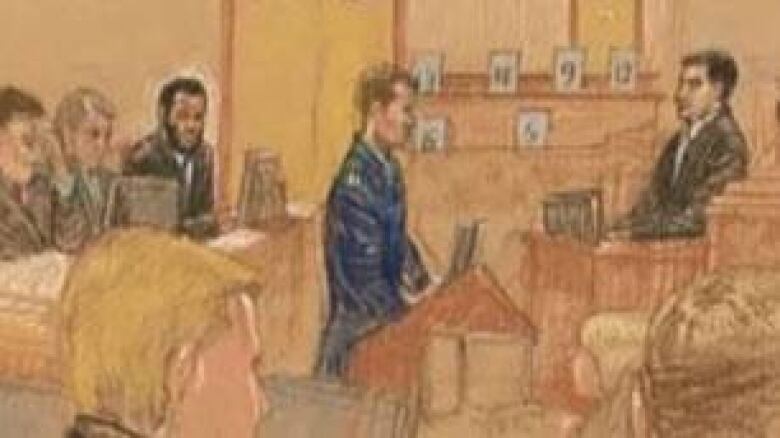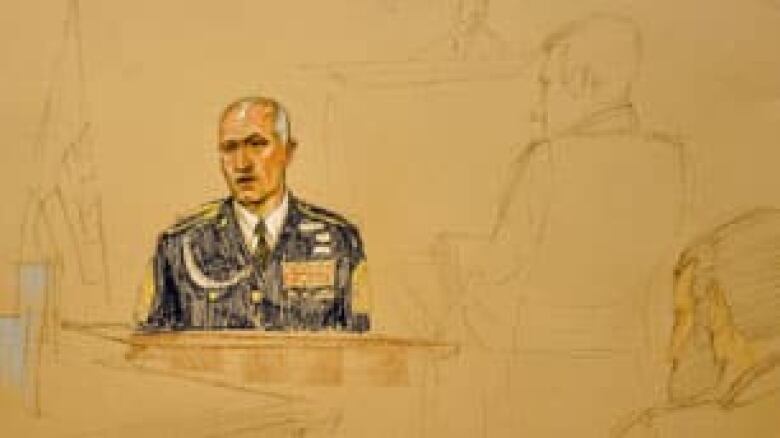Khadr's lawyers attack psychiatrist's claims
Defence lawyers at the sentencing hearing of Omar Khadr on Wednesday tried to discredit a forensic psychiatrist who said Khadr is likely to re-enter a life of jihadism ifhis radical viewsdon'tchange after his detention at Guantanamo Bay, Cuba.

Testifying earlier in the day, Dr. MichaelWelner pointed to factors he said made Khadr'seasy reintegration unlikely:
- Histotal lack of remorse for killing a U.S. soldier in Afghanistan in 2002.
- His unwillingness to speak to psychologists during his eight-year detention at Guantanamo Bay.
- And his close ties to his family, which continues to support al-Qaeda.
That Khadr is considered "al-Qaeda royalty" is also a factor, Welner said, testifying for the prosecution.
But Khadr's lawyers questionedWelner's testimony, suggesting his knowledge of radical jihad behaviour was based primarily on the controversial work of a third-party psychologist rather than his direct assessment of Khadr.
They said Welner relied too heavily on his interviews withNicolai Sennels, a Danish psychologist who drew conclusions about Muslims' integration into society after studying Muslim inmates at a juvenile facility in Copenhagen.
They are also expected to ask Welner how much he was paid to testify on the prosecution's behalf.
Prosecutors at the U.S. military commission hope Welner's testimony will convince jury members that Khadr deserves a harsh sentence for his five crimes, including the murder of an American soldier in Afghanistan in 2002.
In his first day of testimony, Welner said that while Khadrmay seem charming at times he reads Harry Potter books and never instigates fights, for example any remorse Khadr has shown for his crimes is shallow.
He said Khadr has "been marinating in a radical jihadist community" during his eight-year detention.
"He is devout, he is angry, he identifies with his family who have radical jihadist leanings."
Khadr's youth focus of defence
Defence lawyers are also expected to portray Khadr asco-operative and to suggest he is young enough that rehabilitation, rather than incarceration, will be more effective. Khadr was 15 when he threw the grenade that killed Sgt. Christopher Speers.
Even Welner has suggested that re-entry into normal society is not necessarily impossible for Khadr, becausehe is socially agile, strong physically andspeaks four languages.
But Human Rights Watch on Tuesday urged the military commission to consider Khadr's former status as a child soldier in sentencing.
"The U.S. treatment of Omar Khadr has been at odds with international standards on juvenile justice and child soldiers from the very beginning," said Jo Becker, the director of children's rights advocacy for the New-York based group. "The U.S. government's failure to take into account Khadr's age should not persist at his sentencing."
Khadr's lawyers have said that under a plea deal their client would serve eight years for his crimes, which also include attempted murder, conspiracy, providing material aid to terrorists and spying.
The plea deal came to light Monday, when upon the resumption of his trial Khadr withdrew his previous pleas of not guilty and pleaded guilty instead.
Also Wednesday, two soldiers from Speers' special forces unit appearedat the hearing, where they spoke emotionally about his death.

"The loss was catastrophic. It was immediate and it was long lasting," said Capt. E."It is said that any man can be replaced ... that does not apply here."
The two soldiers described how Speers, a medic, went into a minefield to rescue two wounded Afghan children just days before he was mortally wounded in the fight with Khadr.
Speers' widow, whocried through parts of the soldiers' testimony,is expected to appear before the military commission on Thursday.
With files from CBC's Derek Stoffel and Laurie Graham, and The Associated Press












_(720p).jpg)


 OFFICIAL HD MUSIC VIDEO.jpg)
.jpg)



























































































